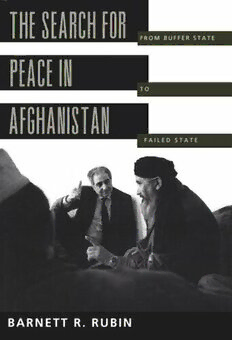
The Search for Peace in Afghanistan PDF
204 Pages·2018·10.462 MB·English
Most books are stored in the elastic cloud where traffic is expensive. For this reason, we have a limit on daily download.
Preview The Search for Peace in Afghanistan
Description:
Afghanistan's fourteen-year-long civil war erupted in 1978 and ended in the disintegration of a state that was first hyperarmed by the superpowers and then abandoned by them. This book analyzes the part played by international politics in this debacle, discussing how changing patterns of strategic conflict and cooperation have affected international negotiations over Afghanistan from the period of the civil war to the present.Drawing on interviews with officials of the United Nations and of various governments, Barnett Rubin recounts the ultimate failure of the Geneva Accords of 1988 to deal effectively with the Afghans' domestic conflict and to establish U.S.-Soviet cooperation in rebuilding Afghanistan. When the Cold War ended and the USSR disintegrated, Afghanistan lost its strategic significance, notes Rubin. The people of this impoverished land were left to fight over their future with sophisticated weapons and little other outside assistance. Integrating theories of international relations and domestic politics, Rubin analyzes how buffer states and post-colonial states are formed through international cooperation, and how this leads to both specific patterns of state formation and particular problems of regime change.This book, along with Rubin's earlier book, The Fragmentation of Afghanistan: State Formation and Collapse in the International System, provides an integrated view of the interaction among various levels of political organization—from village leaders to the U.N. Secretariat—in one of the century's most violent conflicts.
See more
The list of books you might like
Most books are stored in the elastic cloud where traffic is expensive. For this reason, we have a limit on daily download.
